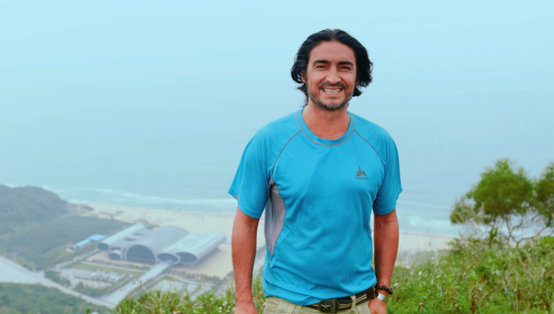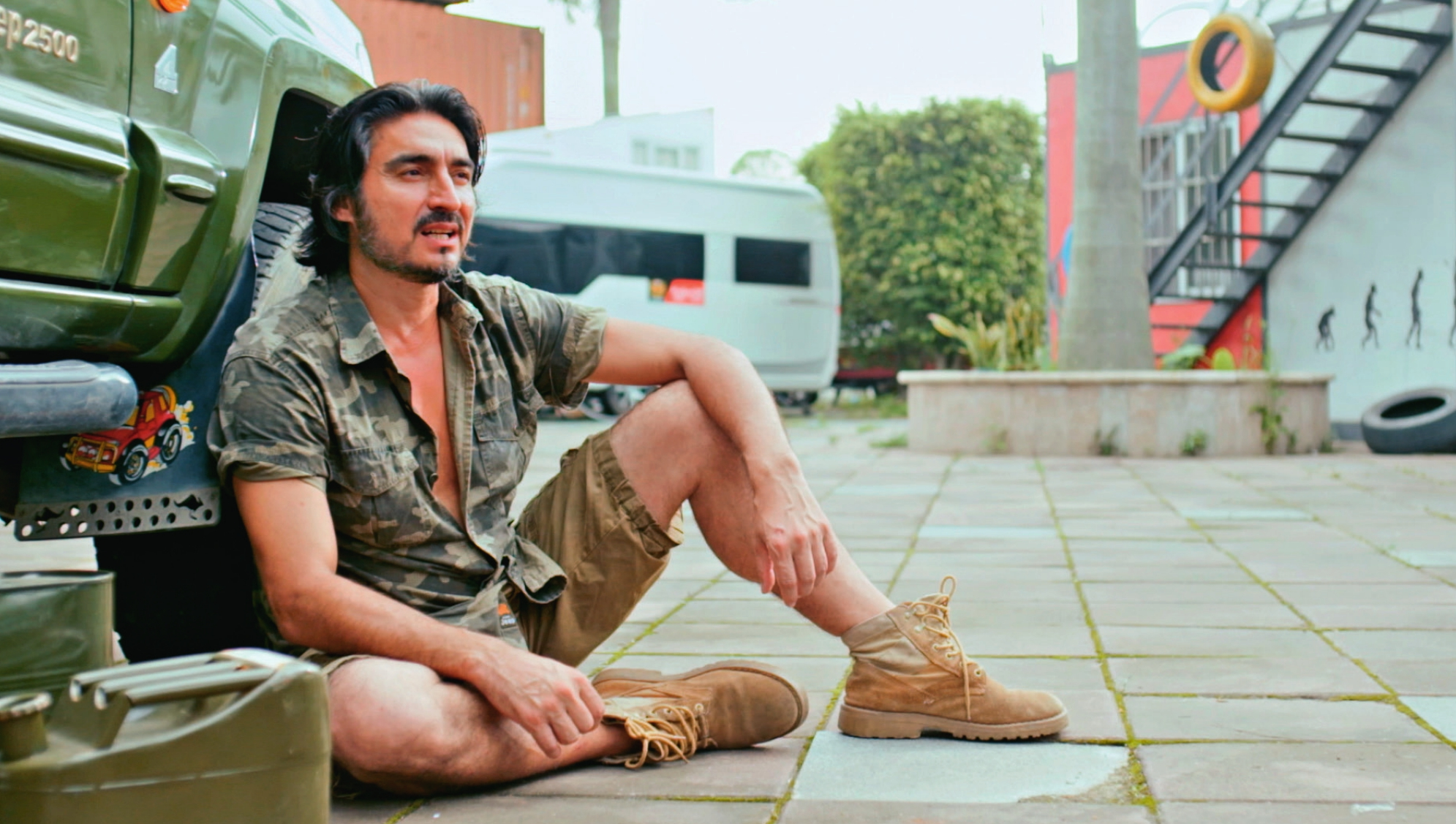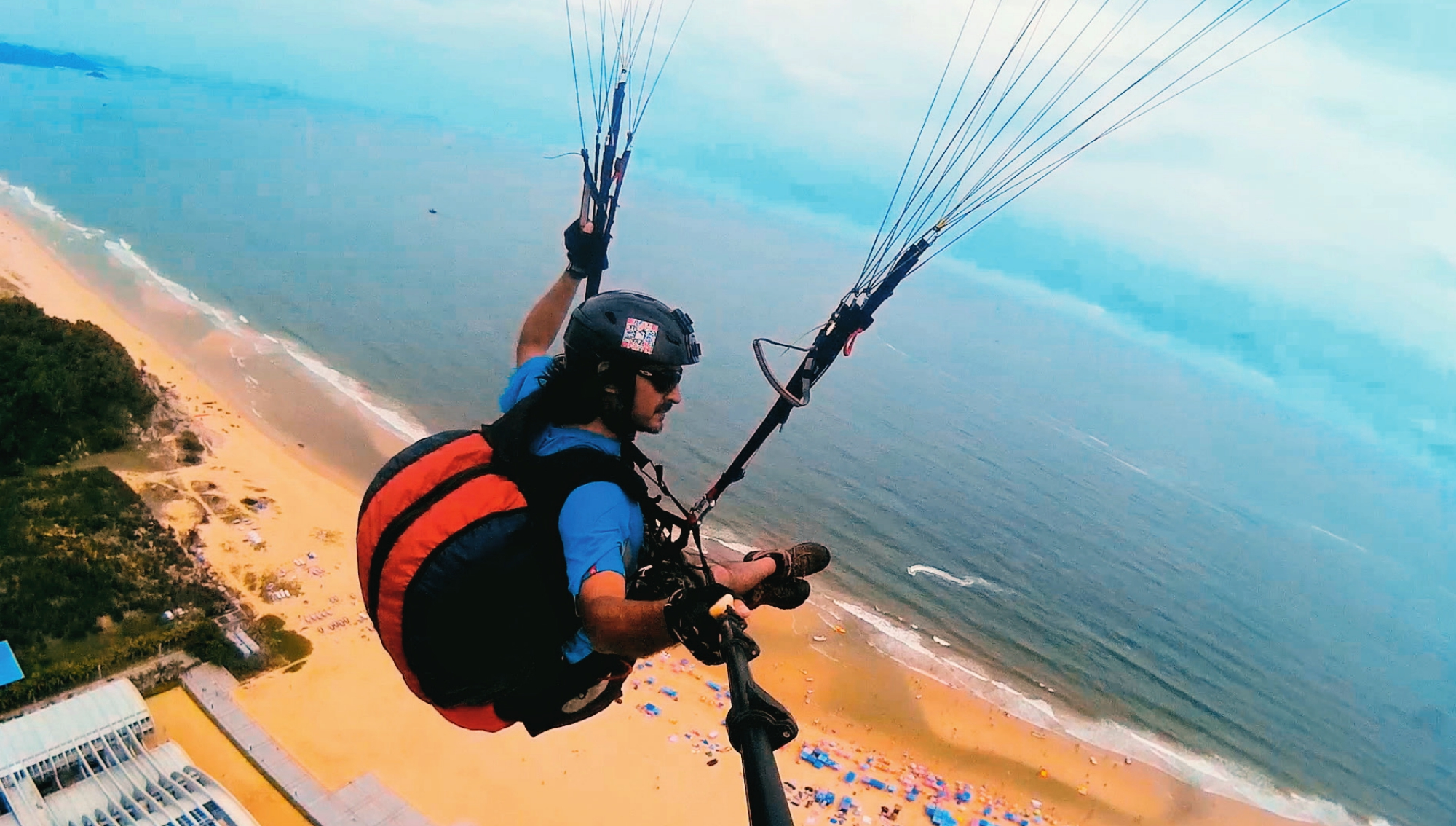
Abulaiti Maimaiti: Every time I fly in the sky, I visualize myself running in the boundless desert under the far-reaching blue sky, and I relive my childhood dream of flying.
I am both very lucky and very unlucky. I was admitted to Kashgar Art School during my first semester of junior high school. Less than a year later, I enrolled in the Department of Music and Dance at the Minzu University of China in Beijing. Upon graduation, I got a job with the Central Ethnic Song and Dance Ensemble, also in Beijing. After working there over two months, I moved to Guangzhou and joined a song and dance troupe attached to the Border Protection Corps of Guangdong Provincial Paramilitary Force. I have indeed made many choices. I feel lucky because I get so many good things so easily-steady jobs, ample food and clothing, a house, a car, and what not. I get things effortlessly. I felt unlucky because I had been doing things I hated.
Since I have little more than 20,000 days to live my life, I thought I might as well make one important choice on my own. In 2002, at age 30, I gave up my easy and decent way of life to pursue my childhood dream of flying.
At age 14 or 15, I left my home in Bachu County, Kashgar, on the edge of the Taklimakan Desert. The desert sands were between 40 and 50 degrees Celsius, hot enough to turn raw eggs into edible food. As a child, I enjoyed walking barefoot on the hot sands and going swimming. Swimming was one of my favorite hobbies, even though my hometown was not rich in water resources. We would go swimming and fishing unless the river was dry. “I swim like a fish!” That’s what I would say when people asked me how I learn swimming in a desert. There were no skyscrapers in my hometown and the desert terrain around us was fat under a blue sky. At times, very naturally, when I looked up at the sky, a strong and fervent desire to fly would rise within me. I kept dreaming of paragliding, and never parted with that dream.
For a career though, my biggest dream was to become a carpenter. By hometown tradition, a man was supposed to start his career as a craftsman. Near my house, there used to be a big timber factory, where a lot of carpenters worked. I became attracted to carpentry after watching them work. Shortly after, I bought tools such as axes and saws. However, I was coincidentally admitted to Kashgar Art School, where I spent less than two years before being selected to enroll in the Department of Music and Dance of the Minzu University of China. So, my carpenter dream fell away. In 1986, I took a hard seat train ride from Kashgar to Beijing that lasted three days and four nights. Because I never attended a Mandarin-based school in Xinjiang, I could say only a few words in Chinese-simple words like “you, me, and him.”
My first day in Beijing brought distinct change and culture shock as it marked a transition from small town to national capital. Everything was new to me, and I was curious and panicky. I didn’t sleep at all my first night in Beijing because I was excited and a little nervous. I found everything frightfully new and strange. Another reason I stayed awake was that I wanted to pee badly, but couldn’t find a toilet because I didn’t know how to say the word in Chinese. I had to wait until daybreak. Eventually, I learned how to get around using gestures.
I had a lot to adapt to, especially diet and language. I began to learn Chinese from scratch and tried to adapt to my new schedule. I got up at 6:00 a.m. to run, went to bed at 10:00 p.m. sharp, and followed a regular diet. It was a totally different world from what I was used to, in terms of pace of life, interpersonal relations, and language. I was homesick a lot, and everything around me reminded me of home. I wanted to go home and live with my parents after graduation.
Due to language barrier, I had to tell what people were trying to say by reading their lips and facial expressions for six months. Using the Uyghur-Chinese dictionary I had with me, I made a plan to learn between 30 and 40 Chinese characters a day, which was a lot, and made it a routine to review and practice them. Soon, I had little difficulty communicating in Chinese, both orally and literally. Thereafter, I fit well into the university, which had students from 56 ethnic groups (including Uyghur). I chose to move to Guangzhou because I could make more money there and help my family financially.
After serving 12 years in the Guangdong Provincial Paramilitary Force, I was pretty much established with nothing to worry about financially. Eventually, however, I became fed up with what I had been doing and decided to make a change. My dream took shape the day I went to a beach outing with a friend, when I spotted someone flying a powered delta wing.
I began preparing. I searched the Internet for where to go to learn, what to learn, for how long, what to do afterwards, and where to set up a paragliding school. I spent a long-time planning and tried to determine how far I could go with my resources. Thereafter, I resolutely opted for demobilization. Carrying a backpack, I headed for Pingdingshan, Henan Province and met with China’s first paragliding coach, who happily accepted me after I introduced myself. My hands shook with excitement the first time I touched the paraglider and grasped the harness. I felt as if I had taken hold of my dream. It was right there in front of me!
How nervous and excited I was the night before my first flight! I could hardly fall asleep as I waited anxiously for the next day to begin. From day one until graduation, I got closer to fulfilling my dream, never wasting a moment of my time.
I also had some hard lessons to learn during the process. My instructor gave me a small paraglider when I was almost done training. Eager to try it in a riverbed before learning to properly operate it, I was dragged away and the skin of my hands was pulled off, not healing for over a month. I learned one thing from that accident: What I love to do can bring me much joy, but it can also easily lead me into something unpredictable. I also learned I had to fully-understand the workings of my flying gear and be very professional about what I was doing.
After about a month of training in Henan Province, I went to Kunming to study the dynamic delta wing technology. I got up at 5:30 a.m. each day to study assembly and practice flying. Classroom training began at 8:00 a.m., during which I learned meteorology, aerodynamics, aeronautical principles, aircraft structure, and other theoretical topics. I spent six months learning how to paraglide before returning to Guangzhou to establish a paragliding school. The school was set up in 2005 and has been in business for 10 years. Because there was no real paragliding school in Guangzhou in those days, I had to do a lot of paperwork and deal with many “relevant departments” to have the club registered. I was frequently kicked back and forth like a ball and was successful only after a lot of effort. I rented an office in a commercial building to serve as the business premises. I had no clients the first six months and had nothing to do at my office. Many friends and relatives tried to persuade me to give up and I began wavering. However, a voice in my heart told me that in the big city of Guangzhou there must be more than one person who wants to paraglide.
The day I recruited my first student and was paid, I treated myself to a good meal, ran up on an overpass, and yelled, “I have a student now! I’m making money!” I was happy I was being recognized, could pay rent, and could make a living doing what I loved. I shed tears of excitement. I treated my student very well and taught him day and night, or whenever he was available. My second student was a news reporter who interviewed me, wrote a story about me, and made me and my school known in Guangzhou. I was then able to attract more and more people. I was more happy than proud that I was doing well in the profession I chose to make a living from. I had not only realized my dream, but was also helping many others realize their dreams. I had a strong sense of accomplishment. I go to Pingdingshan once a year just to fly at the base where I first learned paragliding. One day, the local club had me fly with a little girl who was blind. We flew very high in a tandem paraglider. The airflow was smooth. She kept asking me about the surrounding environment and our flying altitude. She was very excited at first, but went quiet after a while, and then I heard her weeping behind me. Of all those who ever flew with me, the blind girl impressed me most. She made me realize that as a paragliding trainer, I needed to do more than help people fly. I also needed to help them scale the heights of their lives and realize their dreams. Flying is not an innate human capability. We must use equipment and scientific knowledge to reach the sky. Hence, it’s an activity that allows no mistakes or second guessing.
Flight training and promotion can be both stressful and delightful. The greatest thing about coaching is to see a former novice fly and land safely after going through training. Before giving pilots flight assignments, we have to check the weather forecast and prepare and examine the flying equipment. In the same airspace, everyone is equipped with a wireless intercom set to the same frequency so they can report after landing and return to the base together. It looks pretty cool, but it’s actually a detail oriented, rational, and prudent sports activity. Being very strict with students, I have been nicknamed “devil instructor” by some. I told my students a good pilot’s dream should be to paraglide safely until he or she is 80 years old. Thus, we could not afford any mistakes, however minor. There is no minor mistake in paragliding. One day, while preparing a student for a trial flight from the top of a hill having an elevation of several hundred meters, I noticed he was not strapping his legs which, in the event of an accident, could have very serious consequences. I reminded him, “You can’t take off before getting fully geared up!” “I have checked,” he said absentmindedly. “Check if you are flight-ready before taking off,” I reminded him again. He responded the same way, without bothering to look. So, I reminded him a third time by slapping his leg so he would know he wasn’t buckled. Later, he got upset for my “rudeness,” but I actually meant him good. I wanted him to always remember he needed to strap his legs to stay safe.
The school has also met with bottlenecks during its process of development. In the beginning, all I wanted was to teach paragliding, but I also needed to make a living, obtain commercial real estate, and have commercial fights in tourist areas. To develop a new flying ground, I first needed to have an experienced pilot determine whether the area is safe, especially in terms of airflow stability.
One day during a trial flight, due to airflow impacts, I suddenly lost control of my paraglider. In those split seconds, I said to myself, “Oh God! I can’t lose my dream just like this!” I crash-landed on top of a hill. The site was developed only after more trial flights and repeated confirmations that the air currents were stable. After three or four years, however, the venue was requisitioned by real estate developers for commercial property development. Things of this nature are not rare and are one of the reasons club development often runs into hurdles. Security factors and developmental bottlenecks are risks I considered when choosing this profession. I chose it despite all that. I never thought about quitting even though I knew my road was never going to be easy. All I could do was draw lessons from the past and make flights safer so my school would see better development.
Dancing had been for me only a potboiler. Paragliding, by contrast, constantly fills me with a surge of energy that dispels weariness. My passion for it is what helps me overcome hardships and keeps me going. Having flown through all parts of Guangdong Province, my next dream is to fly all across China and keep flying safely until I am 80. My favorite fly zone is Xinjiang and my favorite fy zone in Xinjiang is Kanas.
My flying dream originated in my hometown of Bachu County, a place that gives me a mixed feeling of aspiration and nostalgia. During years of drifting, I’ve had few opportunities to go home and visit my family. I found it difficult to take care of work and my parents at the same time because, among other things, they are not used to the diet and culture of Guangzhou. The drastic changes that have occurred in my hometown make me sad in some ways. Each time I returned home, I enjoyed driving around and stopping at the scenes of my childhood. I stopped at every bridge, desert, and field just to close my eyes and imagine what they once looked like. I took-off my shoes, ran in the scalding sand, and wandered into the woods where we used to play hide and seek. The last time I went home, I bought a Hami melon, smashed it on the ground, and ate it by digging my fingers into it because I had no knife-the same way I did after stealing my neighbors’ melons as a child.
When I look back, I feel I’m part of a fortunate generation because of the healthy and normal childhood I had. The last time I went home, I noticed that my ancestral house, along with the yard and street that gave me infinite memories of joy, were all gone. The big river where I used to swim and fish in summer, and skate in winter, had now been made almost completely fat. I couldn’t even recognize the original location of my ancestral premises. It was in complete disrepair. I felt very bad. In my dreams, my hometown has always been beautiful; in reality, it’s beyond recognition.
City crowds give us a sense of anxiety and oppression. We have been compelled to get used to it because we can’t do anything about it. We may go to the woods or beach for a few days and be immersed in flying for some time. But once we return to the city and are in front of the first traffic light, we must come to terms with reality.
It’s hard to describe how I feel when paragliding. All I hear is the sound of wind and all I see is sky and sea blended together. It’s a most enjoyable feeling of liberty mixed with loneliness. Every time I fly in the sky, I visualize myself running in the boundless desert under the far-reaching blue sky, and I relive my childhood dream of flying. I’m happy I fulfilled that dream, though I can only recall the scenic beauty of my hometown from my memory.

